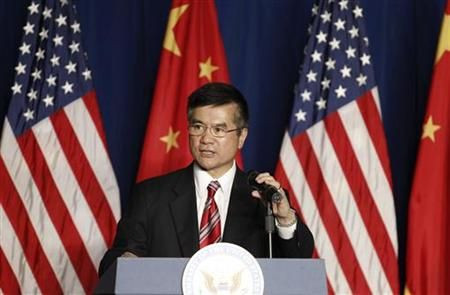U.S. Ambassador To China Gary Locke Resigns; Did Beijing's Notorious Smog Drive Him Away?

U.S. Ambassador to China, Gary Locke, has officially announced his resignation. Appointed by President Barack Obama, Locke joined the U.S. Embassy in Beijing in August of 2011 and has served for two and a half years.
“When I met with President Obama earlier this month, I informed him of my decision to step down as ambassador in early 2014 to rejoin my family in Seattle,” Locke said in an official statement released by the embassy. Locke, the first Chinese-American to hold the position in Beijing, said his position as ambassador was “the honor of a lifetime.”
As a former commerce secretary, Locke was known for using his role as ambassador to promote American businesses and exports during his tenure in Beijing. “Our efforts have focused on job creation in America by increasing exports to China, opening more markets for American companies, and promoting Chinese investment in the United States,” Locke said.
However, many will likely remember Locke for getting involved in human rights issues in China by engaging with ethnic minorities in the remote western part of the vast country China. “We have advanced American values by meeting with religious leaders and human rights lawyers, and [by] visiting Tibetan and Uyghur ethnic minorities in Tibet and Xinjiang.” Perhaps most notably, Locke is known for having a hand in helping secure a travel visa for blind activist Chen Guangcheng for passage to the United States after he escaped from house arrest and sought refuge in the embassy.
However, China’s always-vocal social media microbloggers on Weibo, the Chinese equivalent of Twitter, have speculated that pollution played a role in Locke’s departure. “His wife and kids couldn’t stand the haze,” one blogger suggested. “So back to the U.S. it is.”
Air quality in the capital city of Beijing is often extremely poor, with pollution readings deemed to be “hazardous” on a relatively frequent basis. While conjecture online suggests that the Beijing smog was too much for Locke and his family to handle, Locke quashed such rumors. “We are concerned about [air quality], but that’s not what motivated us to go back,” he told the L.A. Times.
This isn’t the first time China’s bloggers had something to say about Locke. Ahead of his new assignment in Beijing, a photo of Locke and his children at a Starbucks in the Seattle airport snapped by a Chinese entrepreneur went viral on Weibo, with many shocked to see the soon-to-be ambassador carrying his own backpack and attempting to use coupons to buy his coffee. The photo was reportedly shared almost 28,000 times during the height of the story. Weibo users were surprised at Locke's actions, because politicians in China have handlers to take care of such mundane duties.
Not long after, Locke stunned Weibo again when a post about the ambassador flying economy class was shared more than 12,000 times. “Not only did he reject attempts by our ground staff to give him special VIP treatment, he also rejected an upgrade to first class,” the original post read.
Locke was the successor to then Ambassador Jon Huntsman. Less than two years in the position, Huntsman left Beijing to make a failed bid for the White House in the 2012 elections.
© Copyright IBTimes 2024. All rights reserved.






















